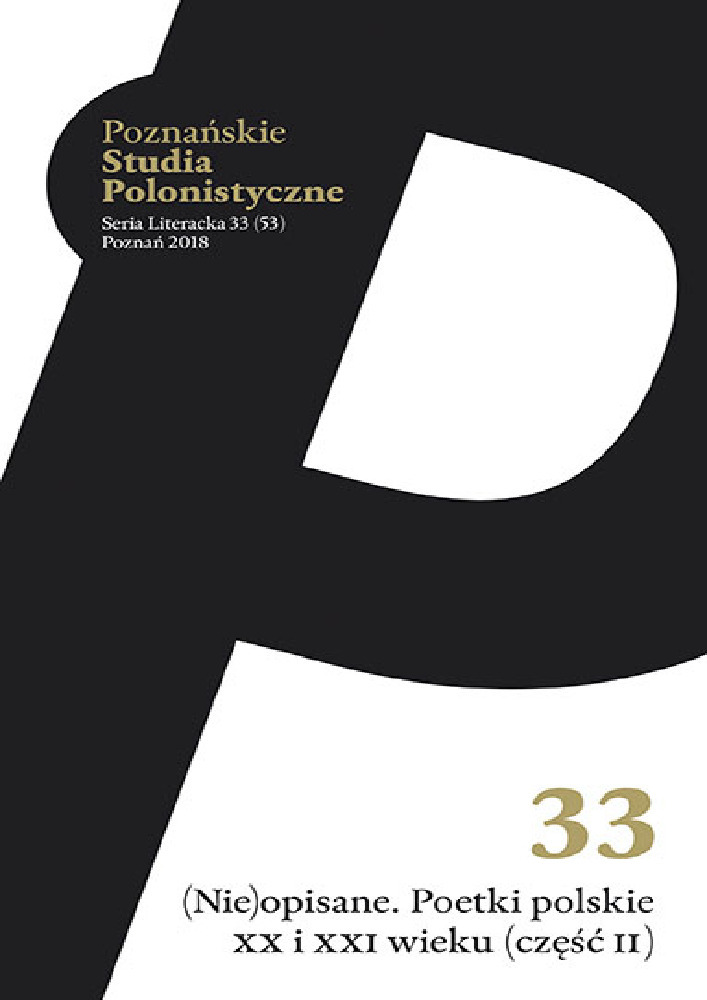Abstract
The key to reading Julia Fiedorczuk’s poems – interpreted within the paradigm of eco-poetry – are the words used in the titles of her poetry volumes: “bio”, “planet” and “oxygen”, which foretell bio-centrism. The poetic imagery unites organic tissues with the artist’s “texture”. A love relationship of a human with a non-human reveals ecological sensitivity, yet it is a painful “love” because it is accompanied by the disagreement about the fragility of existence and the progressing degradation of the planet.References
Barcz Anna (2016), Realizm ekologiczny. Od ekokrytyki do zookrytyki w literaturze polskiej, Wydawnictwo Naukowe „Śląsk”, Katowice.
Czapliński Przemysław (2012), Literatura i życie. Perspektywy biopoetyki, w: Teoria, literatura, życie. Praktykowanie teorii w humanistyce współczesnej, red. Ryszard Nycz, Anna Legeżyńska, Instytut Badań Literackich PAN, Warszawa.
Fiedorczuk Julia (2004), Bio, Biuro Literackie, Wrocław.
Fiedorczuk Julia (2006), Planeta rzeczy zagubionych, Biuro Literackie, Wrocław.
Fiedorczuk Julia (2009), Tlen, Biuro Literackie, Wrocław.
Fiedorczuk Julia (2012), tuż-tuż, Biuro Literackie, Wrocław.
Fiedorczuk Julia (2015a), Cyborg w ogrodzie. Wprowadzenie do ekokrytyki, Wydawnictwo Naukowe Katedra, Gdańsk.
Fiedorczuk Julia (2015b), Złożoność nie jest zbrodnią. Szkice o amerykańskiej poezji modernistycznej i postmodernistycznej, Wydawnictwa Uniwersytetu Warszawskiego, Warszawa.
Fiedorczuk Julia, Beltrán Gerardo (2015), Ekopoetyka. Ekologiczna obrona poezji, Muzeum Historii Polskiego Ruchu Ludowego (Warszawa), Instytut Studiów Iberyjskich i Iberoamerykańskich UW, Warszawa.
Jackson (Riding) Laura (2012), Obroty cudów, wybór, przekład i posłowie Julia Fiedorczuk, Biuro Literackie, Wrocław.
Księgi Pięciu Megilot (1984), przeł. z hebrajskiego i greckiego Czesław Miłosz, Katolicki Uniwersytet Lubelski, Lublin.
Le Guin Ursula K. (2013), Ziemiomorze, przeł. Stanisław Barańczak, Prószyński Media, Warszawa.
Legeżyńska Anna (2009), Od kochanki do psalmistki. Sylwetki, tematy i konwencje liryki kobiecej, Wydawnictwo Poznańskie, Poznań.
License
Authors
Authors of texts accepted for publication in „Poznańskie Studia Polonistyczne. Seria Literacka” are required to complete, sign and return to the editor's office the Agreement for granting a royalty-free license to works with a commitment to grant a CC sub-license.
Under the agreement, the authors of texts published in „Poznańskie Studia Polonistyczne. Seria Literacka” grant the Adam Mickiewicz University in Poznań a non-exclusive, royalty-free license and authorize the use of Attribution-NoDerivatives 4.0 International (CC BY-ND 4.0)Creative Commons sub-license.
The authors retain the right to continue the free disposal of the work.
Users
Interested Internet users are entitled to use works published in „Poznańskie Studia Polonistyczne. Seria Literacka” since 2016, for non-commercial purposes only, under the following conditions:
- attribution - obligation to provide, together with the distributed work, information about the authorship, title, source (link to the original work, DOI) and the license itself.
- no derivatives - the work must be preserved in its original form, without the author's consent it is not possible to distribute the modified work, such as translations, publications, etc.
Copyrights are reserved for all texts published before 2016.
Miscellaneous
Adam Mickiewicz University in Poznań retains the right to magazines as a whole (layout, graphic form, title, cover design, logo etc.).
